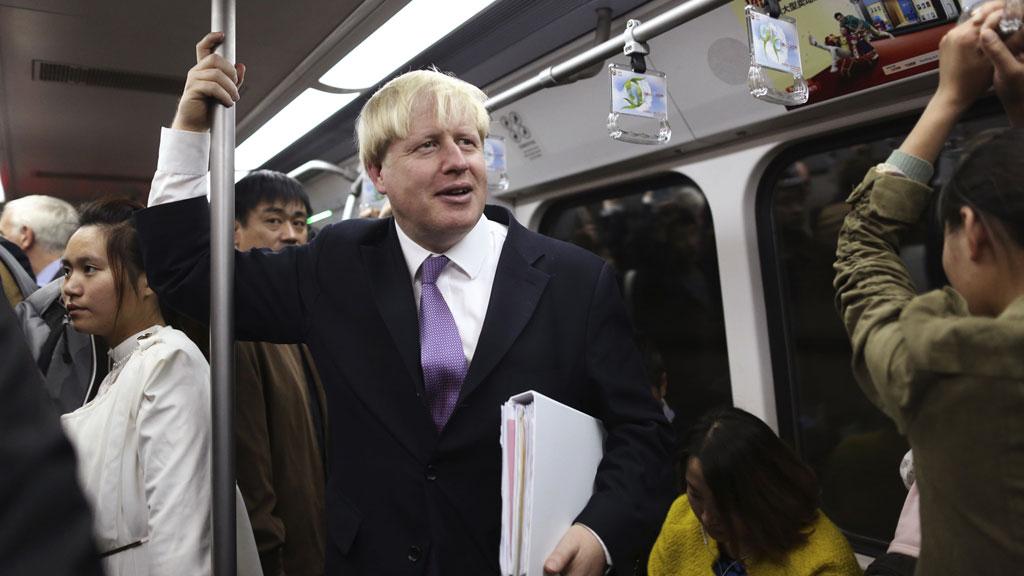Notes from the underground: following Boris in Beijing
Much has changed since Boris last visited Beijing following the 2008 Olympics. He is one of the few British politicians taking advantage of Chinese social media and his popularity is increasing.

The London mayor Boris Johnson has been on a six-day visit to China. He has been raising awareness for investment opportunities in London, convincing Chinese students to enroll in the capital’s universities, and has been riding the Beijing subway. The last time Boris visited Beijing he faced a mixed reception.
Chinese bloggers accused the mayor of not taking the 2008 Olympic Games closing ceremony seriously. He walked around with his hands in his pockets and grabbed the Olympic flag with one hand. Now Boris has his own Chinese language twitter-like account. His most popular post is a photo of him sitting on the Beijing subway, in a trip where he announced that British designer Thomas Heatherwick would be designing two new Beijing subway stations.
It was a post that received some attention. Most were surprised Boris was able to get a seat on a packed train. While other comments were slightly less relevant.
“Get me a job,” one follower wrote.
“He combed his hair,” another netizen posted.
“Hey man, I am expecting you to become the next PM,” wrote another.
Much has been written about the evolution of Boris Johnson. His political career resembles the narrative of a suspect Britain’s got talent contestant, set up to look like a comedy loser by the show’s producers, only to find that once they make it to the stage they can actually sing. Wandering around the Forbidden City a few London tourists caught site of Boris.
They began chanting his name like football fans. He is the only British politician to be addressed by one name, a distinction usually reserved for Brazilian football players. Though he said he prefers the comparisons with Sophocles.
The role of London mayor is well suited to Boris. It enables him to make noise on the world stage (he once said on live American TV, that he regarded America as the proudest creation of London), without obliged to comment on complicated international issues such as China’s relationship with Britain. London simply doesn’t have a foreign policy.
‘Wolf in monk’s clothing’
“They are looking for stuff like the design, the kind of businesses that the UK and London has to offer. And we are starting to see amazing success now from exports from London. What was it, about £3bn worth of cars from Jaguar? Biscuits from London, heaven knows what I have seen in the last few days,” he told me.
China is a difficult card to play, politically. In the period between the Beijing and London Olympic Games, China has risen up the international pecking order. It now holds a unique position as both a developing nation and a contender in the battle for super power status. The nature of its political system means it may never actually announce its arrival. But for all practical purposes, China has indeed arrived.
But for all its economic triumphs, China’s political system remains uncomfortably opaque and the world bends to its principles. George Osborne, who has also been visiting China this week, conceded that David Cameron will not meet with the Dalai Lama again in a bid to improve relations with China. The spiritual leader is seen by the government as a “wolf in monk’s clothing, with the heart of a beast.”
Boris is able to stay out of political issues. Following Boris for a day is a little like watching a surreal new age reality TV show, one where we feel we all know the outcome but may yet surprise us with twists and turns. His critics (and he has quite a few) would say that his popularity is somewhat of an optical illusion.
They would say it has something to do with the fact expectations were so low when he came into office.
It is easier for him now to make the step from mayor to prime minister, than from it was for him to move from backbench politician to London mayor – aide to Boris Johnson
It is no secret that Boris Johnson is laying in the cut of British politics. And he has been there for a while. Most believe that the London mayor harbours ambitions to one day become prime minister.
It is a question I posed to him a few times when I met him in Beijing. And it went unanswered. Boris must keep his ambitions to himself for the sake of not upsetting his bosses and his week in China was no different.
“It is easier for him now to make the step from mayor to prime minister, than from it was for him to move from backbench politician to London mayor,” one of his entourage told me.
At the end of the day I decided to ask Boris a final time about his political future.
“Well I hope that I will be able to get back here before I cease to be mayor… which is in about 3 years time,” he said walking away.
By Danny Vincent, Beijing producer for Channel 4 News